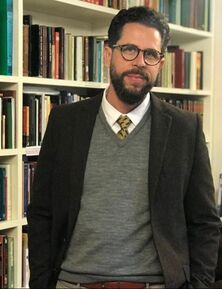About Abdallah Rothman
Dr. Abdallah Rothman is the founder of Shifaa Integrative Counseling and co-founder and Executive Director of the International Association of Islamic Psychology, working at the intersection of Islamic spirituality and mental health practice. He is a Licensed Professional Counselor (LPC) and a Board Certified Registered Art Therapist (ATR-BC), licensed in the United States and currently living abroad in the UAE.
Dr. Abdallah earned an M.A. in Psychology from Antioch University and earned his Ph.D. in Psychology from Kingston University London. He is a student of Professor Malik Badri in Islamic psychology and in addition to his academic training has studied privately with a number of traditional Islamic scholars throughout the Muslim world. Dr. Abdallah's clinical practice as well as his academic research focus on approaching counseling from within an Islamic paradigm and establishing an indigenous theoretical orientation to human psychology that is grounded in the knowledge of the soul from the Islamic tradition. He publishes on this topic in books and journal articles and gives presentations, leads interactive workshops, and is invited to public speaking engagements at universities and organizations around the world. He is visiting professor of psychology at Zaim University Istanbul, International Islamic University Islamabad, and Al-Neelain University Khartoum and is currently the Head of Islamic Psychology of Cambridge Muslim College (CMC). Dr. Abdallah has over 15 years’ experience as a counseling psychologist working with individuals, couples families and youth in a variety of settings. His experience with many different styles and methods of therapy, along with his deep, experiential and immersive study of the Islamic spiritual tradition inform his unique integrative approach to counseling. His method combines different techniques, tools and practices that are catered to the unique needs of each client. In addition to traditional Islamic therapeutic mechanisms and approaches, Dr. Abdallah draws on aspects from many other frameworks and methods of therapy such as; Cognitive Behavioral Therapy, Gestalt Therapy, Somatic Experiencing, Art Therapy, and Spiritual Counseling. Thus his approach is adaptive to the needs and context of a given client and emergent, without predetermined one-size-fits-all techniques and methods. Dr. Abdallah trains psychologists, counselors, coaches and healers in his therapeutic approach within the Islamic Psychology Diploma at CMC, and is currently writing a book about it expected to be published in 2024. |
View recent content by
Dr. Abdallah:
|
|
Education
Doctor of Philosophy in Psychology (PhD) Research concentration: Islamic Psychology & Psychotherapy Kingston University London Master of Arts in Psychology (MA) Concentration: Mental Health Counseling Antioch University Seattle, WA Certification in Art Therapy (MA) Antioch University Seattle, WA Bachelor of Arts in Community Studies (BA) University of California Santa Cruz License, Certifications Licensed Professional Counselor (LPC) Virginia Board of Counseling Registered Art Therapist- Board Certified (ATR-BC) American Art Therapy Association CPR and First Aid Certification American Red Cross Professional Organization Membership American Counseling Association Professional Member American Art Therapy Associaton Professional Credentialed Member International Association of Islamic Psychology Senior Fellow |
Publications
Haque, A. & Rothman, A. (Eds.) (2023). Clinical Applications of Islamic Psychology. Seattle: International Association of Islamic Psychology. Rothman, A., Ahmed, A., & Awaad, R. (2022). The Contributions and Impact of Malik Badri: Father of Modern Islamic Psychology. American Journal of Islam and Society, 39(1-2), 190–213. Rothman, A. (2022). From Padawan to Jedi: The theological premise for the necessity of the master-apprentice relationship in the path of spiritual ascension. In Espinoza, B. (Ed.), Theology and the Star Wars Universe. Rowman and Littlefield (in Press). Rothman, A., & Coyle, A. (2021). The clinical scope of Islamic psychotherapy: A grounded theory study. Spirituality in Clinical Practice. Advance online publication. Rothman, A. (2021). Developing a Model of Islamic Psychology and Psychotherapy: Islamic theology and contemporary understandings of psychology. London: Routledge. Haque, A. & Rothman, A. (Eds.) (2021). Islamic Psychology Around the Globe. Seattle: International Association of Islamic Psychology. Rothman, A. & Haque, A. (2021). Introduction to Islamic Psychology Around the Globe. In Haque, A. & Rothman, A. (Eds.), Islamic Psychology Around the Globe (pp. 1-23). Seattle: International Association of Islamic Psychology. Rothman, A. & Coyle, A. (2020). Conceptualizing an Islamic psychotherapy: A grounded theory study. Spirituality in Clinical Practice, 7(3), 197-213. Khan, F., Keshavarzi, H. & Rothman, A. (2020). The Role of the TIIP Therapist. In Keshavarzi, H., Awaad, R., & Khan, F. (Eds.), Applying Islamic Principles to Clinical Mental Health Care (pp. 38-65). London: Routledge. Rothman, A. (2019). What Islam Offers to Modern Self-Help: An Islamic Paradigm of Psychology [blog post]. The Productive Muslim. Retrieved from https://productivemuslim.com/what-islam-offers-to-modern-self-help/ Rothman, A. (2018). An Islamic Theoretical Orientation to Psychotherapy. In York, C. (Ed.), Islamically Integrated Psychotherapy: Uniting faith and professional practice (pp. 25-56). West Conshohocken, PA: Templeton Press. Rothman, A. & Coyle, A. (2018). Toward a framework for Islamic psychology and psychotherapy: An Islamic model of the soul. Journal of Religion and Health. 57(5), 1731-1744. Rothman, A. (2017). Mental Health and Religious Identity: Inspiring Transformation in Muslim Youth [blog post]. Tabah Futures Initiative. Retrieved from https://medium.com/tabah-vista/https-medium-com-tabah-vista-mentalhealthyouth-3035a6627a3d Haque, A., Khan, F., Keshavarzi, H., & Rothman, A. E. (2016). Integrating Islamic Traditions in Modern Psychology: Research Trends in Last Ten Years. Journal of Muslim Mental Health, 10(1). |